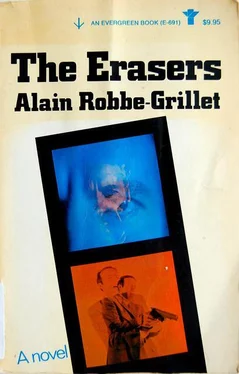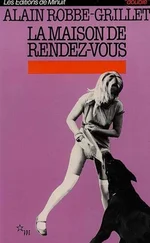Alain Robbe-Grillet - The Erasers
Здесь есть возможность читать онлайн «Alain Robbe-Grillet - The Erasers» весь текст электронной книги совершенно бесплатно (целиком полную версию без сокращений). В некоторых случаях можно слушать аудио, скачать через торрент в формате fb2 и присутствует краткое содержание. Жанр: Криминальный детектив, на английском языке. Описание произведения, (предисловие) а так же отзывы посетителей доступны на портале библиотеки ЛибКат.
- Название:The Erasers
- Автор:
- Жанр:
- Год:неизвестен
- ISBN:нет данных
- Рейтинг книги:4 / 5. Голосов: 1
-
Избранное:Добавить в избранное
- Отзывы:
-
Ваша оценка:
- 80
- 1
- 2
- 3
- 4
- 5
The Erasers: краткое содержание, описание и аннотация
Предлагаем к чтению аннотацию, описание, краткое содержание или предисловие (зависит от того, что написал сам автор книги «The Erasers»). Если вы не нашли необходимую информацию о книге — напишите в комментариях, мы постараемся отыскать её.
The Erasers — читать онлайн бесплатно полную книгу (весь текст) целиком
Ниже представлен текст книги, разбитый по страницам. Система сохранения места последней прочитанной страницы, позволяет с удобством читать онлайн бесплатно книгу «The Erasers», без необходимости каждый раз заново искать на чём Вы остановились. Поставьте закладку, и сможете в любой момент перейти на страницу, на которой закончили чтение.
Интервал:
Закладка:
In his extreme exhaustion, snatches of his wasted day still come back to torment him: “…and if, at that moment, I had thought about…and if I had…” He chases away these obsessions with an impatient shake of his head. Now it is too late.
Forty-three multiplied by one hundred-fourteen. Four times three, twelve. Four times four, sixteen. Sixteen and one, seventeen. Forty-three. Forty-three. Two. Seven and three, ten. Four and three, seven. Seven and one, eight. Eight and one, nine. Four. Four thousand nine hundred two. There is no other possible solution. “Four thousand nine hundred two…that’s not so good, my boy. Forty-nine square centimeters of surface: you need at least fifty, you know.”
Only one centimeter-all he was missing was that ridiculous space.
He still has two tiny millimeters left over. Two last tiny millimeters. Two square millimeters of dream…It isn’t much. The glaucous water of the canals rises and overflows, covers the granite quays, overflows the streets, spreads its monsters and its mud over the whole city…
Wallas stands up: if he stays here without moving, he will really go to sleep. He tries to take his comb out of his inside jacket pocket, but his gestures are clumsy and in grasping the case he drops his wallet, out of which several papers fall. His carte d’identite shows him that face that once was his; he walks over to the dresser to see himself in the mirror and compares the image with the photograph: lack of sleep, aging his features, has re-established the resemblance. Besides, it would be no use changing this photograph, he need only let his mustache grow out again. He doesn’t really have a narrow forehead, it’s only that his hairline is low.
Putting the papers back in the wallet, Wallas cannot find the return train ticket. He looks to see if it is not still on the floor near the bed; he then searches through all his pockets; he looks through the wallet once again. He remembers having seen the ticket there during the day. He must have dropped it while taking out some money. It was also the only proof of the exact time of his arrival in the city.
On the telephone, Fabius did not have the dramatic reactions Wallas feared. He only half listened to his agent’s account. The chief was on a new lead: now it was the next crime, tonight’s, that was supposed to occur in the capital, according to him, at least.
Wallas begins to shave. He hears the throaty laugh of the stationery saleswoman-more annoying than provocative.
“I’m going to have to go…”
“Sometimes you go through hell and high water to find a murderer, and the crime hasn’t even been committed. You go through hell and high water to discover it “ “…quite far from him, whereas one need only point toward one’s own chest…” Where do these phrases come from?
It is not the stationery saleswoman’s laugh; the noise is coming from downstairs-probably from the cafe.
Antoine is very pleased with his joke. He turns to the right and the left to see if his entire audience has had the benefit of it. The pharmacist, who is the only who has not laughed, merely says:
“That’s ridiculous. I don’t see why it wouldn’t snow in October.”
But Antoine has just noticed, in the newspaper one of the sailors is reading, a headline that makes him exclaim:
“There, what did I say!”
“What did you say?” the pharmacist asks.
“Hey, bartender, what did I say! Albert Dupont is dead. Look here, you can see for yourself that he’s named Albert and that he’s dead as a doornail!”
Antoine takes the newspaper away from the sailor and holds it over the bar. In silence the manager begins reading the article in question: “Walking home as he was accustomed to do every evening…”
“All right,” Antoine says, “who was right?”
The manager does not answer; he calmly continues reading. The others have resumed their argument over the early winter. Antoine, growing impatient, repeats:
“Well?”
“Well,” the manager says, “you’d be better off reading to the end before you start laughing. It’s not the same story as yesterday. This was last night; and yesterday it was the day before yesterday. Besides, this one isn’t a burglar that shot at him: it’s a car that skidded and ran over him on the edge of the sidewalk. ‘…the driver of the truck, after pulling back onto the road, escaped toward the harbor…’ Read first, instead of talking so much. If you can’t tell the difference between yesterday and today there’s no use talking.”
He gives back the newspaper and picks up the empty glasses to rinse them.
“You’re not trying to tell us,” Antoine says, “that someone named Dupont gets killed every night.”
“There’s more than one donkey at the fair…” the drunk begins sententiously.
Wallas, after shaving, goes back downstairs to drink a cup of hot coffee. It must be ready by this time. The first person he sees when he comes into the cafe is the riddle-man whose question: “What animal in the morning…” he has been vainly trying to reconstruct all night…
“Good morning,” the drunk says with his jubilant smile.
“Good morning,” Wallas answers. “Will you give me a cup of black coffee, please?”
A little later, while he is drinking his coffee at a table, the drunk comes over and tries to start a conversation. Wallas finally asks him:
“How did that riddle of yours go yesterday? What animal…”
The drunk, delighted, sits down opposite him and searches his memory. What animal…Suddenly his face lights up; he rinks and begins enunciating with an infinitely sly expression:
“What animal is black, has six legs, and flies?”
“No,” Wallas says, “it was something else.”
A wipe of the rag. The manager shrugs. Some people actually lave time to waste.
But he mistrusts the friendly manners his lodger puts on so willingly. A man who dresses like that doesn’t take a room and lien spend the whole night out. And why did that man from the police station want to talk to him last night?
“I’m the manager.”
“Oh, it was you! You’re the one who told an inspector that lonsense about some fictitious son of Professor Dupont?”
“I didn’t say anything like that. I said that sometimes young people came in here, they’re all ages-some young enough to ^e Dupont’s sons…”
“Did you say he had a son?”
“I don’t even know whether he had any!”
“All right, let me speak to the manager.”
“I’m the manager.”
“Oh, it was you! You’re the one who told that nonsense about the fictitious son of Professor Dupont?”
“I didn’t say anything.”
“Did you say he had a son?”
“I don’t even know whether he had any. All I said was that young people of all ages came in here.”
“You’re the one who told that nonsense, or was it the manager?”
“I’m the manager.”
“You’re the one, young people nonsense, professor at the bar?”
“I’m the manager!”
“All right. Let me certainly have a son, a long time age fictitious young died so strangely…”
“I’m the manager. I’m the manager. The manager. I’m the manager…the manager…the manager…”
In the troubled water of the aquarium, furtive shadows pass. The manager is motionless at his post. His massive body lean: on his outspread arms; his hands grip the edge of the bar; his head hangs down, almost threatening, the mouth somewhat twisted, the gaze blank. Around him the familiar specters dance their waltz, like moths circling a lampshade and bumping into it, like dust in the sun, like little boats lost at sea, lulling to the sea’s rhythm their delicate cargo, the old casks, the dead fish, the rigging and tackle, the buoys, the stale bread, the knives and the men.
Интервал:
Закладка:
Похожие книги на «The Erasers»
Представляем Вашему вниманию похожие книги на «The Erasers» списком для выбора. Мы отобрали схожую по названию и смыслу литературу в надежде предоставить читателям больше вариантов отыскать новые, интересные, ещё непрочитанные произведения.
Обсуждение, отзывы о книге «The Erasers» и просто собственные мнения читателей. Оставьте ваши комментарии, напишите, что Вы думаете о произведении, его смысле или главных героях. Укажите что конкретно понравилось, а что нет, и почему Вы так считаете.












